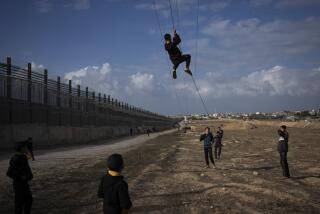Egypt, Sudan Drawing Battle Lines for a Stretch of Sand
- Share via
CAIRO — As turf wars go, this one is about as obscure as they come. Egypt and Sudan recently have taken time from their pressing national problems to squabble over the Halaib triangle, a desolate stretch of Nubian Desert along the Red Sea that historically was inhabited by fierce and mysterious tribes.
Khartoum, which has its hands full waging a 14-year war against rebels in southern Sudan, has been accusing Egypt of belligerent actions, including cutting off water and power supplies to the small Sudanese police force in the sparsely inhabited outpost.
Sudan also contends that Egypt has fired artillery near the police garrison. The Khartoum government even petitioned the Arab League this month to intervene, a proposal that the Pan-Arab body quietly let die.
For its part, Cairo denies any wrongdoing but maintains that the Sudanese have no reason to be on Egypt’s land anyway. If nothing else, Halaib underscores the prickly pride of Sudan, a country that can boast of being Africa’s largest nation, but which is dwarfed by Egypt in terms of population, wealth, development and military might.
Since Sudan gained independence in 1956, it has asserted ownership of the triangle, a wedge of desert, hills and shoreline north of the 22nd parallel, that line in the sand that all Egyptian boys and girls learn is their country’s southern border.
The ambiguity about the area’s ownership stems from the intermingled history of Egypt and Sudan.
In an unusual colonial arrangement, Sudan was deemed to be a joint Egyptian-British possession from 1899 until 1956. During this period, Egypt assigned administrative control over about 7,000 square miles around the port town of Halaib to the colonial governor in Khartoum. But Egypt says it never relinquished its political stake to the territory.
When Sudan became independent, Egypt sent troops to the triangle to uphold its claim. But in deference to the local residents, Egypt agreed to tolerate a force of civilian police from Sudan.
The result is an anomalous situation that persists today: Egyptian soldiers and Sudanese police cohabit the same parcel of desert claimed by both nations.
Egypt did boost its military presence in 1993, when it accused Sudan of aiding Islamic militants opposed to the Egyptian government. Relations further deteriorated when Cairo said Sudan had harbored three suspects in a 1995 assassination attempt against Egyptian President Hosni Mubarak in Ethiopia.
Confident that they have more than enough muscle to maintain control, Egyptians tend to laugh off Sudan’s pronouncements about Halaib.
“This is the typical psychology of a smaller neighbor toward a larger neighbor,” said one senior Egyptian diplomat. “They always feel as if they are going to be colonized.”
But Egypt still can take the matter seriously, as was evident Sept. 17 when an edition of the Pan-Arab daily Al Hayat was barred from distribution in Egypt by censors.
The reason? The paper reported that Sudanese President Omar Hassan Ahmed Bashir visited the Halaib triangle and complained about Egypt’s alleged recent “aggravations.”
Bashir said Egypt was trying to provoke Sudan “into a side conflict to deviate its attentions from major problems and worries,” but he assured his audience that Sudan would not abandon a “policy of self-control.”
Given Egypt’s sanguine stance and Sudan’s self-control, is this perennial border dispute likely to escalate? It might, if economic factors make the Halaib real estate worth fighting for.
More to Read
Sign up for Essential California
The most important California stories and recommendations in your inbox every morning.
You may occasionally receive promotional content from the Los Angeles Times.













